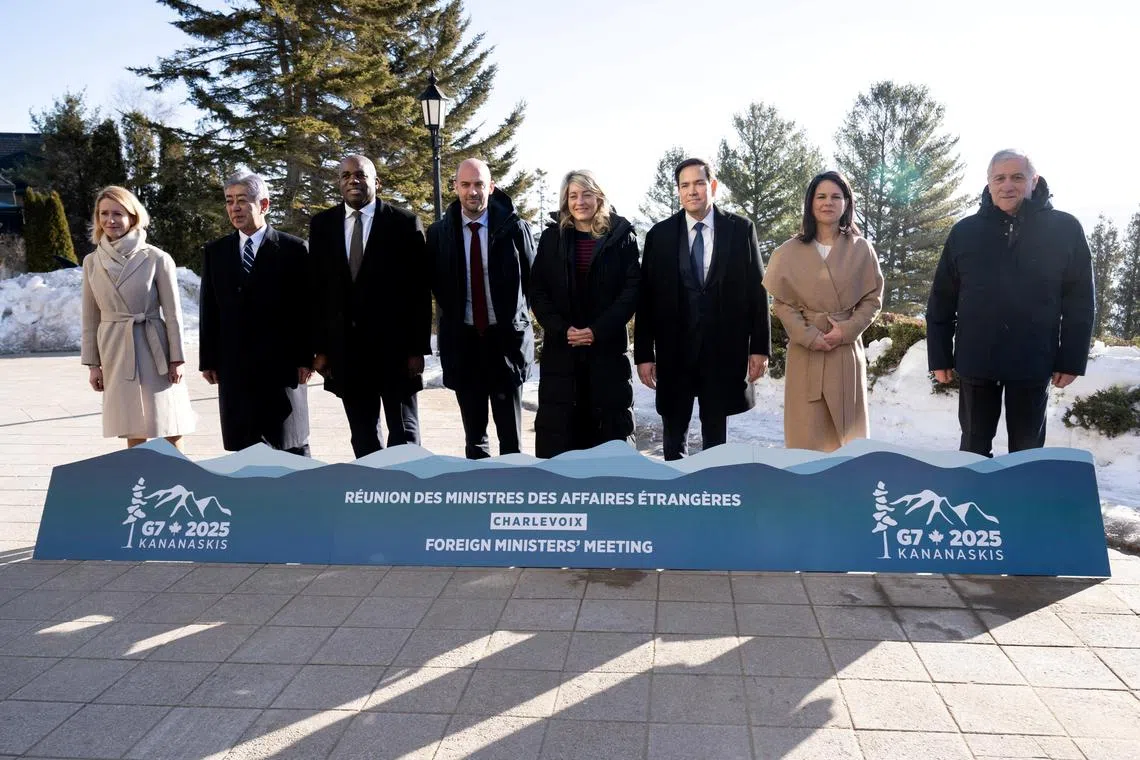G-7 ministers unite to back Ukraine and warn Russia of sanctions
Sign up now: Get ST's newsletters delivered to your inbox

(From left) EU foreign policy chief Kaja Kallas with G-7 foreign ministers Takeshi Iwaya, David Lammy, Jean-Noel Barrot, Melanie Joly, Marco Rubio, Annalena Baerbock and Antonio Tajani.
PHOTO: REUTERS
LA MALBAIE, Canada – Foreign ministers from the Group of Seven (G-7) nations reached a deal on a joint statement aimed at showing unity on March 14 that backed Ukraine’s territorial integrity and warned Russia to follow Kyiv in accepting a ceasefire or face possible further sanctions.
The meeting followed weeks of tension between US allies and President Donald Trump over his upending of Western trade, security and Ukraine-related policy.
G-7 officials had feared they would not be able to agree on an all-encompassing document touching on geopolitical issues from across the world, divisions that they said could have played into the hands of both Russia and China.
“I think we’re on track to have a strong statement. I’m confident that can be the case,” Canadian Foreign Minister Melanie Joly told reporters minutes before ministers approved a final text.
“When it comes to different issues, Ukraine and the Middle East, we’ve had sessions talking about these different issues, subjects and the goal was to keep strong G-7 unity.”
The G-7 ministers from Britain, Canada, France, Germany, Italy, Japan and the US, along with the European Union, convened in the remote tourist town of La Malbaie, nestled in the Quebec hills, for meetings on March 13 and 14 that in the past have been broadly consensual.
But in the run-up to the first G-7 meeting of Canada’s presidency, the crafting of an agreed final statement had been difficult with wrangling over the language regarding Ukraine, the Middle East and Washington’s desire for tougher wording on China.
In the final draft, they “reaffirmed their unwavering support for Ukraine in defending its territorial integrity and right to exist, and its freedom, sovereignty and independence”.
An earlier text referring to the need for security guarantees to ensure a truce was replaced by “assurances”, but they did warn Moscow to follow Kyiv in agreeing to a ceasefire or face further sanctions, including oil price caps.
“G-7 members called for Russia to reciprocate by agreeing to a ceasefire on equal terms and implementing it fully,” they said.
“They emphasised that any ceasefire must be respected and underscored the need for robust and credible security arrangements to ensure that Ukraine can deter and defend against any renewed acts of aggression,” they added, in a reference to Ukraine’s territorial integrity.
Red lines
Washington had sought to impose red lines on language around Ukraine to not harm its talks with Russia murky shipping network
The final communique stated G-7 opposition to any unilateral attempts to change the status quo across the Taiwan Strait by force or coercion, language that will likely be encouraging to Taipei.
There had been wrangling over language regarding Gaza and the Middle East, notably the notion of a two-state solution for the Israeli-Palestinian conflict, something the US was resisting.

Canada’s Ms Joly speaking during the G-7 foreign ministers meeting in La Malbaie, Quebec, on March 13.
PHOTO: REUTERS
The final draft made no mention of a two-state solution, dropping language that had stressed its importance in earlier drafts of the text.
“They underscored the imperative of a political horizon for the Palestinian people, achieved through a negotiated solution to the Israeli-Palestinian conflict that meets the legitimate needs and aspirations of both peoples and advances comprehensive Middle East peace, stability and prosperity,” the draft read. REUTERS


